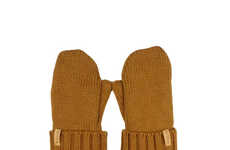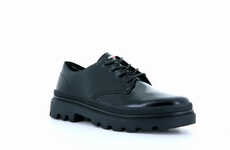
Oliberte Strives to Build a Middle Class in Africa
Tiana Reid — October 23, 2010 — Social Good
Oliberté is a Canada-based premium footwear company that does its manufacturing in Africa with the goal of building a middle class through the creation of fair-paying jobs. In fact, many development theories are premised on the idea that a thriving middle class is an essential factor to both economic and social development. Oliberté‘s explicit goal is to create fair jobs that promote the creation of a strong middle class in Africa—a class that currently does not exist.
By creating essential partnerships with African factories, Oliberté ensures that everyone involved maintains ethical and fair practices. Women consist of roughly half of all employees, even the administrative positions. Furthermore, by offering benefits like free or subsidized lunches, tea breaks and maternity leave, Oliberté goes beyond what most other factories are doing in the region. The factories use safe equipment and chemicals, as well as leather that is sourced from free-range and hormone-free livestock. Interestingly, Oliberté isn’t looking to gloss over the challenges the company faces. When outlining its environment practices on its website, Oliberté states that its greatest environmental challenge is flying the footwear out of the African countries. Nonetheless, they are looking to switch to a greener method by the end of 2011.
Footwear fanatics, like Selectism and Hypebeast, are fawning over Oliberté—and not just for the urban design and laid-back style, but also for its socially-conscious practices. Oliberté has operations in Kenya, Liberia and Ethiopia, but hopes to expand to Zambia, Cameroon, Congo and Uganda in the future, in order to really hold true to its slogan “This is Africa.” Oliberté footwear is sold in Canada, Japan, Netherlands, Finland, the United States and also online.
Contact Information:
Oliberté Website
603 York Street
Oakville, Ontario
L6L 4B4
Canada
Telephone: 1-905-901-3660
Fax: 1-416-849-0101
By creating essential partnerships with African factories, Oliberté ensures that everyone involved maintains ethical and fair practices. Women consist of roughly half of all employees, even the administrative positions. Furthermore, by offering benefits like free or subsidized lunches, tea breaks and maternity leave, Oliberté goes beyond what most other factories are doing in the region. The factories use safe equipment and chemicals, as well as leather that is sourced from free-range and hormone-free livestock. Interestingly, Oliberté isn’t looking to gloss over the challenges the company faces. When outlining its environment practices on its website, Oliberté states that its greatest environmental challenge is flying the footwear out of the African countries. Nonetheless, they are looking to switch to a greener method by the end of 2011.
Footwear fanatics, like Selectism and Hypebeast, are fawning over Oliberté—and not just for the urban design and laid-back style, but also for its socially-conscious practices. Oliberté has operations in Kenya, Liberia and Ethiopia, but hopes to expand to Zambia, Cameroon, Congo and Uganda in the future, in order to really hold true to its slogan “This is Africa.” Oliberté footwear is sold in Canada, Japan, Netherlands, Finland, the United States and also online.
Contact Information:
Oliberté Website
603 York Street
Oakville, Ontario
L6L 4B4
Canada
Telephone: 1-905-901-3660
Fax: 1-416-849-0101
Trend Themes
1. Ethical Manufacturing - The trend of ethical manufacturing in the footwear industry provides an opportunity for companies to build a middle class and promote fair-paying jobs.
2. Socially-conscious Practices - The growing demand for socially-conscious practices in the footwear industry presents an opportunity for innovative companies to align their business goals with social development.
3. Expansion Into African Markets - The expansion of footwear companies into African markets offers a disruptive innovation opportunity to tap into a new customer base while promoting economic growth in the region.
Industry Implications
1. Footwear Manufacturing - The footwear manufacturing industry has the potential to embrace fair practices and create jobs that build a strong middle class.
2. Fashion and Lifestyle - The fashion and lifestyle industry can seize the opportunity to cater to socially-conscious consumers by promoting brands that prioritize fair manufacturing practices.
3. International Trade - The expansion of footwear companies into African markets can disrupt the international trade industry and open up new business opportunities for global trade.
0.7
Score
Popularity
Activity
Freshness























